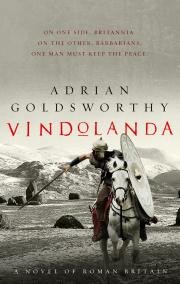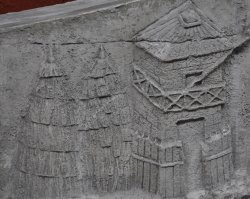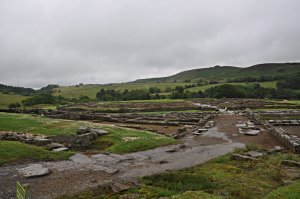

Roman Fiction
VINDOLANDA
Adrian Goldsworthy discusses the book.
- Why I have written Vindolanda, and why I have waited until now
- What I didn't know
- Vindolanda - why then and why there
- Vindolanda - the place
- Northern Britain in AD 98
Vindolanda - why then and why there:

The novel is set in the Autumn of AD 98. Trajan had become emperor at the start of the year, but would not travel to Rome until later in AD 99. It's one of those little details you tend to forget, because Trajan was later so widely praised as one of the great emperors. It was less than thirty years since the great civil war that followed the death of Nero and brought to power Vespasian, who was succeeded in turn by his sons Titus and Domitian. After the latter's murder, the elderly Nerva was proclaimed emperor, and he subsequently adopted Trajan. Neither man had any particular claim to the throne, and at this stage Trajan had no more than a modest military reputation. His father had been one of Vespasian's generals, so he had links to the old regime, something that was not necessarily an asset now that Domitian had suffered damnatio memoriae - the public damning of his name and its removal from monuments. With hindsight we know that Trajan thrived, forging a reputation as a great soldier and conqueror, that he was succeeded by Hadrian, then Antoninus Pius and Marcus Aurelius, so that the second century AD is often seen as the golden age of the Roman Empire. At the time it must have seemed a real possibility that civil war would erupt as senators in command of the biggest provincial armies made bids for power.
This uncertainty offers a great backdrop for the stories, as does the situation in Britain at the time, a decade or so after the Romans had abandoned the majority of their bases in what would become Scotland. We shall talk more about this later, but suffice it to say that few would have given odds on the Romans keeping control of the bulk of Britain for another three hundred years.
As we shall see, I have drawn a lot from the Vindolanda writing tablets, and in particular the archives of Flavius Cerialis and his wife Sulpicia Lepidina. He was commander of cohors VIIII Batavorum in the third fort on the site at Vindolanda. Although earlier estimates dated this fort on c. AD 98, they now tend to date it a little later, to nearer 100. Cerialis may have arrived a year or so after that, but we cannot be sure. So I have bent the evidence a little to have the couple newly arrived in September 98. This is still just about possible, and in a novel I'm happy to do this because it does provide a great setting.
So that is why the story is set when it is, while the location comes from the inspiration of the Vindolanda writing-tablets. These give us glimpses of life around an army base on the frontier, and they are all the more fascinating because much of this is so mundane. This is a long way from the world of emperors and high politics, and yet still part of the same empire.
In many ways, I have always thought of this story and its sequels as essentially a Western, but set in northern Britain at the end of the first century AD. It is about a frontier where different cultures meet and all too often clash, and about the people caught up in it all. There was always going to be more than a dash of John Ford films like the Cavalry trilogy and The Searchers, of early Peckinpah like Major Dundee and Aldrich's Ulzana's Raid. So it is a mix of the romantic, always a necessary component in an adventure story to stop becoming too serious and grim, and the harsher reality which you need to make the romantic bits of the story matter. It will only work if the world seems real, the people are interesting enough for you to care what happens, and there is a sense that it all could have happened like this, even when the story is invented.

I knew I wanted to write about the Roman army, because I have been fascinated by it for so many years, but did not want it to be just about them, nor turn the local peoples and the tribes further afield into faceless enemies. Hence the idea of a Briton serving as an officer in the Roman army, and Ferox was born. He is one of the Silures because they fought the Romans hard for decades before they were beaten, and because they lived in what happens to be my home. The timing also fitted nicely, with the Silures suffering final defeat between AD 74-78. The teenage Ferox is too young to fight in those wars, but old enough to have absorbed much of his people's culture and wisdom, and then gets sent off to be educated in the Roman empire. Then he has time to fight in Domitian's wars on the continent, win fame and glory, and then get discredited and disillusioned, and wind up years later on the frontier in Britain. He is fictional, but his life fits the real events very neatly.
Next month we shall talk more about Ferox, a man straddling two worlds, and also about Vindolanda, both the place and the texts.